Recent Articles
Popular Makes
Body Types
No Hybrid!
Seven reasons NOT to go green
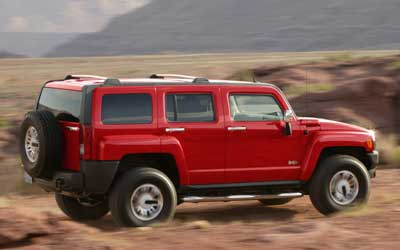
Hybrids are Evil. You heard it here first, and here's why: they cost more money, don't deliver an equal value for all that cash and will keep the filthy little foreign oil rats in business for another 30 years. Hybrids do nothing well but everything okay. That makes about as much sense as diet soda, fat-free ice cream or low-tar cigarettes. Conservation. Hah - go build a better engine. Less dependence on foreign oil. Yeah - like a heroin junkie can do just a little bit of smack at a time. If you are seriously considering a hybrid vehicle, wake up and turn off the television. And by the way - if you really want to save a tree -- go ride a bike to work or take a train. Hybrid technology is just a ploy to extend the consumer life of the internal combustion engine and - here's the headline - get us to pay more for less.
Fuel
Hybrid fuel-efficiency is a bedtime story. The best real-world mileage you can expect from the likes of a Toyota Prius is around 48 mpg, which really isn't all that much better than most decent cars on the road. But let's put this to the test, based on real-world gas mileage. The 2005 Ford Escape Hybrid really gets around 28 miles per gallon combined city and highway, and the regular, comparably equipped V6 manages about 18 miles to the gallon. The difference in cost, assuming 13,000 miles driven at an average of $3 per gallon is about $770 a year, a savings, true -- but not all that remarkable. As hybrids age, the efficiency of their small internal combustion engines - and probably the electric motors - will decline, thus eliminating any return on investment.
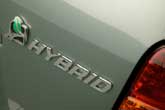
Foreign Oil
Hybrids deflect the real issue: hydrogen mobility. Hybrids still use oil, so therefore they perpetuate its significance. In fact, they make it worse, because with hybrids on the road it now enables automakers to delay switching to hydrogen and allows governments to slow down investment in a hydro infrastructure. As everyone waits for big business to catch up and prepare for the obvious and necessary hydrogen shift, we continue to place our national security at risk by sucking crude out of the Middle East. Hybrids will extend the consumable life of the internal combustion engine, which is essentially 19th century technology, and put the brakes on the development of feasible hydrogen transportation.
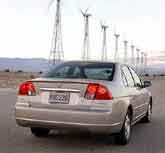
Emissions
Hybrids are dirty. You could do more for the environment if you were to purchase $3,000 worth of trees and have them planted in the rain forest. Really. Sure, hybrid cars run clean - based on existing vehicle pollution metrics. But chances are that whirring electric motors and nickel-hydride batteries also emit pollution, and there's no telling what the environmental cost will be 20 years down the line. There is also a question of recycling hybrid batteries. Right now, it really isn't an issue, because there just aren't that many batteries to dispose of, but that will change - and quick. This day will come, and here's the headline: Automakers Scramble to Dump Nickel Hydride.
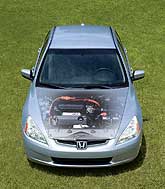
Price
Hybrids cost more. According to the government's fuel economy.gov website, there's a "clean fuel" deduction of $2,000 for most hybrids, if they are placed in service by the end of 2005. The new highway bill signed into law last month also provides for some purchase incentives. All told, deductions defray some of the premium price tagged onto hybrid vehicles, with the exception of the Toyota Prius, with is competitively priced with non-hybrid vehicles at around $20,000. As for the others, a hybrid buyer in the 27 percent tax bracket will save in the neighborhood of $500, based on the $2,000 tax incentive currently being offered. And by 2007, that tax break will probably go away. But if you're in the market now, take that $500, subtract a buck or two for fuel savings, which for the 2005 Ford Escape Hybrid works out to be about $500 a year, and hybrids still cost more. And that's on paper. In real-world terms, the price gap is more like a gulf when you factor in real fuel economy and the dealer markup driven by limited availability and few choices. Hybrid sedan shoppers are limited to the Toyota Prius or the Honda Accord Hybrid so as a result, there's more demand and the price goes up. Conversely, a savvy shopper can buy an overstocked sedan and all they have to do is move the cash they've piled up on the hood. There are so many different types of vehicles on the market now, that it's ridiculous to restrict yourself to only a few cars that have a waiting list. The fact that what you're buying is barely proven technology may also up the cost of these vehicles, thanks to a potential free fall in their value as used vehicles.
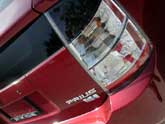
Performance
Hybrids are still slow and heavy slugs. The 2005 Ford Escape Hybrid, for example, weighs 300 lbs. more than the traditional model and gives up 45 horsepower. Performance, as a result, suffers, and does so dramatically: What was once an SUV rated to haul around 3000 lbs. is now a hybrid SUV that can only pull 1,000 lbs. For that, you get to pay in the neighborhood of $3,000 more.

Unproven
Hybrid reliability is a dangerous mystery. You're at a red light, and you hear the quiet purr of your gentle hybrid whining down and shutting off. You smile, because you know you're not polluting while standing still, and you're saving buckets of gas. When the light turns green, you hit the accelerator and slowly start to creep. You're used to this now, because you bought the so-called full hybrid, and you assume that it's probably just the electric motors doing their thing. That makes you smile again. But something is wrong; people are honking and you're still going 3 mph. You get to the middle of the intersection and, oh oh - the darn thing clicks off and dies. You're not smiling anymore. Of course, automakers have run their hybrid darlings through tough tests that simulate real-world conditions. But buyer beware -- this is the same crowd that suffers through constant recalls on cars they've been building for 20 years. Granted, all hybrids offer warranties of around 8 years/100,000 miles, but even the best warranty can't call a tow truck, make your 5-year-old behave on the side of the road, or live with the upheaval of vehicle repair. The fact is, like the ratings given for fuel economy, it's nearly impossible to accurately gauge how a car will stand up to the daily grit of traffic jams, run-and-gun drivers and hard braking. Sure, hybrids such as the Honda Insight, Honda Civic Hybrid and Toyota Prius have survived the first generation largely unscathed, but these are small cars, and the powertrain technology of today's hybrid vehicles is more complex. The end result is the potential for breakdowns, costly repairs and wasted time. Common sense dictates that smart buyers will wait to see how the first raft of these more powerful and complex hybrid systems perform on the streets of America.
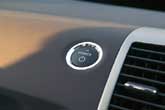
Repair
Hybrids will make you a dealer service captive. Try it out - go to a dealership and ask the salesperson if you can get your hybrid repaired at any reputable garage. Then watch as they stammer, stutter and do a little dance. It's fun to see, but the experience of finding an independent shop that will do work on a hybrid isn't fun at all. It may well turn into a frustrating search for a shop that will forego a hybrid premium. The reason is safety: it takes around 50 volts to deliver a fatal blast of electricity, and hybrids carry much more - the Toyota Prius delivers 276 volts via its hybrid system. This danger has mandated a series of safety steps that must be taken to ensure there is no power to the vehicle. Because a hybrid engine can be powered up - but with the engine off - this increases the risk of electrocution. Even if a shop's technicians are well trained in the safety aspects of hybrid repair, the fact is that these are complicated systems that are harder to work on, even if you don't have to work on the actual hybrid parts. Certainly, as hybrids grow more popular, the number of qualified technicians will increase, and the price of service and repair will decrease. But until then, choices are limited - and like the hybrid sticker price itself - more expensive.
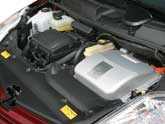
Wrap
There is no sensible reason to buy hybrid. Fuel savings are minimal, performance suffers, repair is problematic and the price is high. The powertrain is overly complicated, and though automakers have thoroughly tested these vehicles, they will likely suffer when exposed to real world driving conditions. As a result, in a few years there will be mountains of batteries that automakers can't dispose of properly, and fleets of hybrids will be selling cheap on used car lots. If you still want a hybrid when this happens, go for it -- you're sure to get a good price. Or you can have fun now with a car that moves you better at a lower price, and wait until hydrogen cars hit the market.
